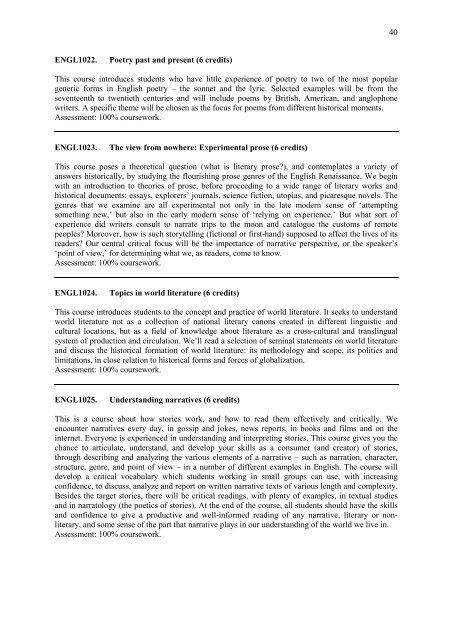(BA) (4-year-programme) - The University of Hong Kong
(BA) (4-year-programme) - The University of Hong Kong
(BA) (4-year-programme) - The University of Hong Kong
Create successful ePaper yourself
Turn your PDF publications into a flip-book with our unique Google optimized e-Paper software.
40ENGL1022.Poetry past and present (6 credits)This course introduces students who have little experience <strong>of</strong> poetry to two <strong>of</strong> the most populargeneric forms in English poetry – the sonnet and the lyric. Selected examples will be from theseventeenth to twentieth centuries and will include poems by British, American, and anglophonewriters. A specific theme will be chosen as the focus for poems from different historical moments.Assessment: 100% coursework.ENGL1023.<strong>The</strong> view from nowhere: Experimental prose (6 credits)This course poses a theoretical question (what is literary prose?), and contemplates a variety <strong>of</strong>answers historically, by studying the flourishing prose genres <strong>of</strong> the English Renaissance. We beginwith an introduction to theories <strong>of</strong> prose, before proceeding to a wide range <strong>of</strong> literary works andhistorical documents: essays, explorers’ journals, science fiction, utopias, and picaresque novels. <strong>The</strong>genres that we examine are all experimental not only in the late modern sense <strong>of</strong> ‘attemptingsomething new,’ but also in the early modern sense <strong>of</strong> ‘relying on experience.’ But what sort <strong>of</strong>experience did writers consult to narrate trips to the moon and catalogue the customs <strong>of</strong> remotepeoples? Moreover, how is such storytelling (fictional or first-hand) supposed to affect the lives <strong>of</strong> itsreaders? Our central critical focus will be the importance <strong>of</strong> narrative perspective, or the speaker’s‘point <strong>of</strong> view,’ for determining what we, as readers, come to know.Assessment: 100% coursework.ENGL1024.Topics in world literature (6 credits)This course introduces students to the concept and practice <strong>of</strong> world literature. It seeks to understandworld literature not as a collection <strong>of</strong> national literary canons created in different linguistic andcultural locations, but as a field <strong>of</strong> knowledge about literature as a cross-cultural and translingualsystem <strong>of</strong> production and circulation. We’ll read a selection <strong>of</strong> seminal statements on world literatureand discuss the historical formation <strong>of</strong> world literature: its methodology and scope, its politics andlimitations, in close relation to historical forms and forces <strong>of</strong> globalization.Assessment: 100% coursework.ENGL1025.Understanding narratives (6 credits)This is a course about how stories work, and how to read them effectively and critically. Weencounter narratives every day, in gossip and jokes, news reports, in books and films and on theinternet. Everyone is experienced in understanding and interpreting stories. This course gives you thechance to articulate, understand, and develop your skills as a consumer (and creator) <strong>of</strong> stories,through describing and analyzing the various elements <strong>of</strong> a narrative – such as narration, character,structure, genre, and point <strong>of</strong> view – in a number <strong>of</strong> different examples in English. <strong>The</strong> course willdevelop a critical vocabulary which students working in small groups can use, with increasingconfidence, to discuss, analyze and report on written narrative texts <strong>of</strong> various length and complexity.Besides the target stories, there will be critical readings, with plenty <strong>of</strong> examples, in textual studiesand in narratology (the poetics <strong>of</strong> stories). At the end <strong>of</strong> the course, all students should have the skillsand confidence to give a productive and well-informed reading <strong>of</strong> any narrative, literary or nonliterary,and some sense <strong>of</strong> the part that narrative plays in our understanding <strong>of</strong> the world we live in.Assessment: 100% coursework.
















